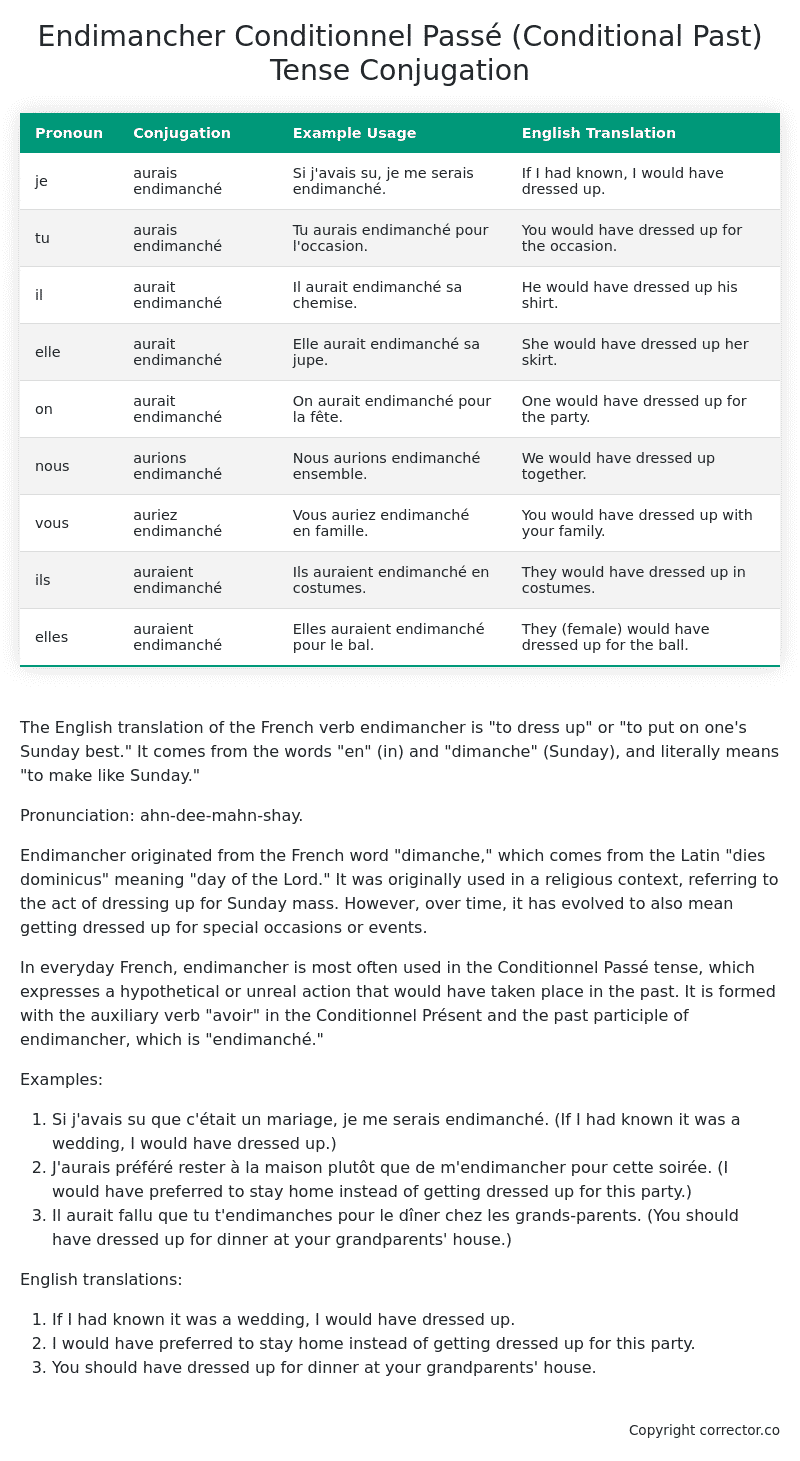Conditionnel Passé (Conditional Past) Tense Conjugation of the French Verb endimancher
Introduction to the verb endimancher
The English translation of the French verb endimancher is “to dress up” or “to put on one’s Sunday best.” It comes from the words “en” (in) and “dimanche” (Sunday), and literally means “to make like Sunday.”
Pronunciation: ahn-dee-mahn-shay.
Endimancher originated from the French word “dimanche,” which comes from the Latin “dies dominicus” meaning “day of the Lord.” It was originally used in a religious context, referring to the act of dressing up for Sunday mass. However, over time, it has evolved to also mean getting dressed up for special occasions or events.
In everyday French, endimancher is most often used in the Conditionnel Passé tense, which expresses a hypothetical or unreal action that would have taken place in the past. It is formed with the auxiliary verb “avoir” in the Conditionnel Présent and the past participle of endimancher, which is “endimanché.”
Examples:
- Si j’avais su que c’était un mariage, je me serais endimanché. (If I had known it was a wedding, I would have dressed up.)
- J’aurais préféré rester à la maison plutôt que de m’endimancher pour cette soirée. (I would have preferred to stay home instead of getting dressed up for this party.)
- Il aurait fallu que tu t’endimanches pour le dîner chez les grands-parents. (You should have dressed up for dinner at your grandparents’ house.)
English translations:
- If I had known it was a wedding, I would have dressed up.
- I would have preferred to stay home instead of getting dressed up for this party.
- You should have dressed up for dinner at your grandparents’ house.
Table of the Conditionnel Passé (Conditional Past) Tense Conjugation of endimancher
| Pronoun | Conjugation | Example Usage | English Translation |
|---|---|---|---|
| je | aurais endimanché | Si j’avais su, je me serais endimanché. | If I had known, I would have dressed up. |
| tu | aurais endimanché | Tu aurais endimanché pour l’occasion. | You would have dressed up for the occasion. |
| il | aurait endimanché | Il aurait endimanché sa chemise. | He would have dressed up his shirt. |
| elle | aurait endimanché | Elle aurait endimanché sa jupe. | She would have dressed up her skirt. |
| on | aurait endimanché | On aurait endimanché pour la fête. | One would have dressed up for the party. |
| nous | aurions endimanché | Nous aurions endimanché ensemble. | We would have dressed up together. |
| vous | auriez endimanché | Vous auriez endimanché en famille. | You would have dressed up with your family. |
| ils | auraient endimanché | Ils auraient endimanché en costumes. | They would have dressed up in costumes. |
| elles | auraient endimanché | Elles auraient endimanché pour le bal. | They (female) would have dressed up for the ball. |
Other Conjugations for Endimancher.
Le Present (Present Tense) Conjugation of the French Verb endimancher
Imparfait (Imperfect) Tense Conjugation of the French Verb endimancher
Passé Simple (Simple Past) Tense Conjugation of the French Verb endimancher
Passé Composé (Present Perfect) Tense Conjugation of the French Verb endimancher
Futur Simple (Simple Future) Tense Conjugation of the French Verb endimancher
Futur Proche (Near Future) Tense Conjugation of the French Verb endimancher
Plus-que-parfait (Pluperfect) Tense Conjugation of the French Verb endimancher
Passé Antérieur (Past Anterior) Tense Conjugation of the French Verb endimancher
Futur Antérieur (Future Anterior) Tense Conjugation of the French Verb endimancher
Subjonctif Présent (Subjunctive Present) Tense Conjugation of the French Verb endimancher
Subjonctif Passé (Subjunctive Past) Tense Conjugation of the French Verb endimancher
Subjonctif Imparfait (Subjunctive Imperfect) Tense Conjugation of the French Verb endimancher
Conditionnel Présent (Conditional Present) Tense Conjugation of the French Verb endimancher
Conditionnel Passé (Conditional Past) Tense Conjugation of the French Verb endimancher (this article)
L’impératif Présent (Imperative Present) Tense Conjugation of the French Verb endimancher
L’infinitif Présent (Infinitive Present) Tense Conjugation of the French Verb endimancher
Struggling with French verbs or the language in general? Why not use our free French Grammar Checker – no registration required!
Get a FREE Download Study Sheet of this Conjugation 🔥
Simply right click the image below, click “save image” and get your free reference for the endimancher Conditionnel Passé tense conjugation!

Endimancher – About the French Conditionnel Passé (Conditional Past) Tense
Formation
Common Everyday Usage Patterns
Expressing Unreal Past Scenarios
Polite Requests or Suggestions
Expressing Doubt or Uncertainty
Interactions with Other Tenses
Conditional Present
Indicative Past Tenses
Conditional Future
Summary
Want More?
I hope you enjoyed this article on the verb endimancher. Still in a learning mood? Check out another TOTALLY random French verb conjugation!


